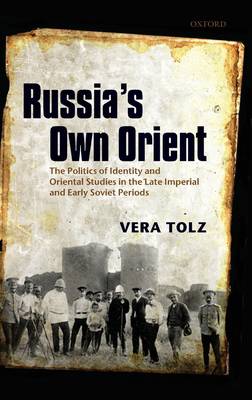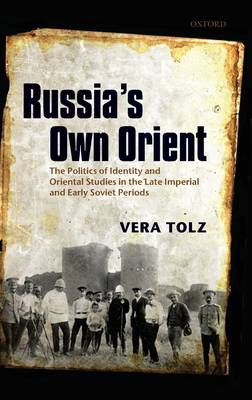
- Retrait gratuit dans votre magasin Club
- 7.000.000 titres dans notre catalogue
- Payer en toute sécurité
- Toujours un magasin près de chez vous
- Retrait gratuit dans votre magasin Club
- 7.000.0000 titres dans notre catalogue
- Payer en toute sécurité
- Toujours un magasin près de chez vous
Russia's Own Orient
The Politics of Identity and Oriental Studies in the Late Imperial and Early Soviet Periods
Vera Tolz
249,95 €
+ 499 points
Description
Russia's own Orient examines how intellectuals in early twentieth-century Russia offered a new and radical critique of the ways in which Oriental cultures were understood at the time. Out of the ferment of revolution and war, a group of scholars in St. Petersburg articulated fresh ideas about the relationship between power and knowledge, and about Europe and Asia as mere political and cultural constructs. Their ideas anticipated the work of Edward Said and post-colonial scholarship by half a century. The similarities between the two groups were, in fact, genealogical. Said was indebted, via Arab intellectuals of the 1960s who studied in the Soviet Union, to the revisionist ideas of Russian Orientologists of the fin de siecle. But why did this body of Russian scholarship of the early twentieth century turn out to be so innovative? Should we agree with a popular claim of the Russian elites about their country's particular affinity with the 'Orient'? There is no single answer to this question. The early twentieth century was a period when all over Europe a fascination with things 'Oriental' engendered the questioning of many nineteenth-century assumptions and prejudices. In that sense, the revisionism of Russian Orientologists was part of a pan-European trend. And yet, Tolz also argues that a set of political, social, and cultural factors, which were specific to Russia, allowed its imperial scholars to engage in an unusual dialogue with representatives of the empire's non-European minorities. It is together that they were able to articulate a powerful long-lasting critique of modern imperialism and colonialism, and to shape ethnic politics in Russia across the divide of the 1917 revolutions.
Spécifications
Parties prenantes
- Auteur(s) :
- Editeur:
Contenu
- Nombre de pages :
- 216
- Langue:
- Anglais
- Collection :
Caractéristiques
- EAN:
- 9780199594443
- Date de parution :
- 08-04-11
- Format:
- Livre relié
- Format numérique:
- Genaaid
- Dimensions :
- 152 mm x 234 mm
- Poids :
- 476 g

Les avis
Nous publions uniquement les avis qui respectent les conditions requises. Consultez nos conditions pour les avis.






